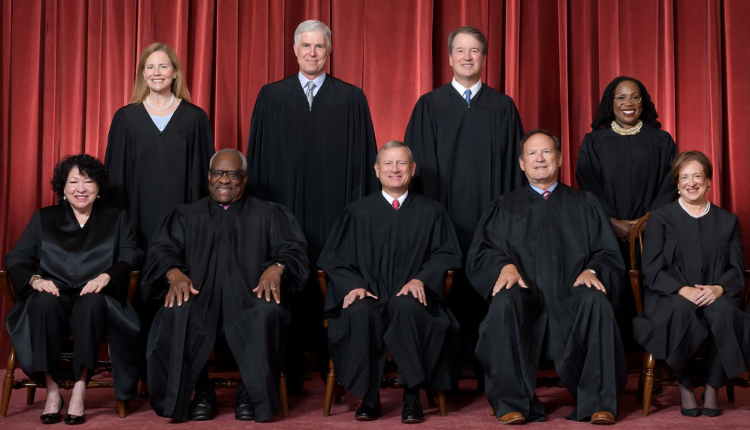Jackson's votes in Supreme Court's first 6 opinions make her 'last justice standing'

The U.S. Supreme Court as composed June 30, 2022, to present. Photo by Fred Schilling via the Supreme Court website.
Justice Ketanji Brown Jackson is the only U.S. Supreme Court justice who joined every majority decision without a separate concurrence in the first six merits opinions released this term, making her the “last justice standing.”
In a series of tweets March 2, departing SCOTUSblog editor James Romoser noted that Jackson “has been fully in the majority in the initial series of rulings, some of which have scrambled the usual ideological blocs.”
Jackson’s six-opinion run in the majority is “more likely an anomaly than an indicator of her future positions,” according to Adam Feldman of the Empirical SCOTUS blog.
He noted in a March 8 blog post that the high court’s first six merits opinions are in cases that are not particularly “ideologically laden.”
One case, for example, concerned whether a highly paid oil-rig employee was entitled to overtime pay under the Fair Labor Standards Act of 1938. The majority comprised Jackson, along with Chief Justice John Roberts and Justices Elena Kagan, Clarence Thomas, Sonia Sotomayor and Amy Coney Barrett.
Still, it is “pretty unusual” for a new justice to remain the last justice to agree in full with every majority decision after joining the court in the same calendar year that the term began, Feldman said. Justice Brett Kavanaugh is the only other current justice with that distinction. He was in the majority without concurrences in his first 12 decisions during his first term on the court beginning in 2018.
The 2005 term was already underway when Justice Samuel Alito joined the Supreme Court in 2006. He was the last justice standing in the first 15 cases decided after he joined the Supreme Court, however.
Next, Feldman looked at the justices who were the last justice standing in the last 10 terms. They were:
• 2021: Kavanaugh (six decisions)
• 2020: Roberts and Kavanaugh (14 decisions)
• 2019: Roberts (19 decisions)
• 2018: Kavanaugh (12 decisions)
• 2017: Roberts (nine decisions)
• 2016: Kagan (29 decisions)
• 2015: Anthony Kennedy (19 decisions)
• 2014: Stephen Breyer (13 decisions)
• 2013: Kennedy (19 decisions)
• 2012: Roberts (25 decisions)
• 2011: Roberts (14 decisions)
Hat tip to How Appealing.



